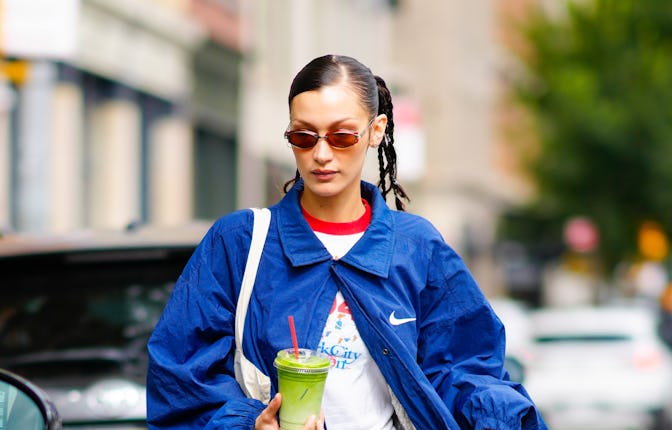Bella Hadid got sober, and wants to talk about it
Yes, the public reveal is part of a partnership with a non-alcoholic drink brand — but it’s still important.

We’ve had a rough couple of years, that’s undeniable. Amidst the COVID-19 pandemic and major political unrest, researchers have also noted an uptick in alcohol consumption. It’s a trend that was reported back in 2020, but continued through 2021. Resources have begun to emerge, like the medical institution Cedars-Sinai dedicating a portion of their blog to “Dialing back pandemic drinking,” and the New York Times published a popular piece on how to cut back. The NYT also did an exposé on how the emergence of the Omicron variant is dashing people’s plans of a “Dry January” in 2022.
But you also have the converse: the anxious booze-guzzling has others reexamining their relationships with alcohol and embracing what’s been deemed a “sober curious lifestyle.” One survey shows that there is actually an uptick of 13% of people, mostly millennials, participating in Dry January this year, or at least a “damp January.” Bella Hadid has now joined their ranks, and is talking about going alcohol-free as she promotes her new partnership with alcohol substitute brand Kin Euphorics.
For Hadid, the shift came as a way to alleviate her pain with anxiety and depression. Before this announcement, Hadid had made headlines for changing how she used Instagram. She went from using the platform to exclusively post the glamorous makings of a supermodel’s life like parties, tropical vacations, and behind-the-scenes looks at photoshoots with a drink in hand, to posting selfies of herself crying. She opened up recently about the glam-free posts to WSJ Magazine, saying that the photos started from her trying to communicate with loved ones and doctors about how bad her anxiety and depression had gotten; she decided to make the photos public to help fans who had similar struggles. She told the magazine, “Even though on Instagram things look so beautiful, at the end of the day, we are all cut from the same cloth. I felt like it was just good for me to be able to speak my truth and at some point I wasn’t able to post nice pretty pictures anymore.”
Hadid admits now that alcohol wasn’t helping her mental health. The model told In Style of her choice to live differently roughly six months ago, “I don't feel the need [to drink] because I know how it will affect me at 3 in the morning when I wake up with horrible anxiety thinking about that one thing I said five years ago when I graduated high school. ... There's just this never-ending effect of, essentially, you know, pain and stress over those few drinks that didn't really do much, you know?” Hadid said the decision was made even easier when one of Kin’s medical advisors showed her her own brain scans that starkly revealed the ramifications of alcohol on the brain.
Hadid is now a co-founder and partner at Kin, a company that pushes drinks that swap alcohol or the sugar of mocktails for beverages with adaptogens and nootropics, designed to help you “get high on your own supply.” Their effectiveness is up for debate — and a lot of the jargon behind them is nothing new in the massive wellness industry. But having a wider array of alcohol-free options on the market helps to destigmatize the decision to refrain from drinking, and offer a more welcoming social experience for sober people. You can say what you want about Bella Hadid and this being just another paid partnership, but celebs choosing those partnerships more meaningfully is important, and Hadid’s work to help alleviate woes tied to mental health and substance abuse is a positive thing in the long run.